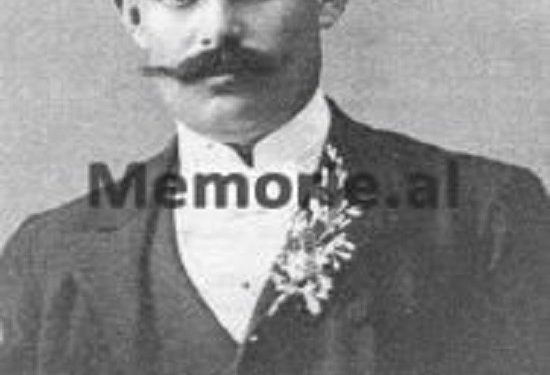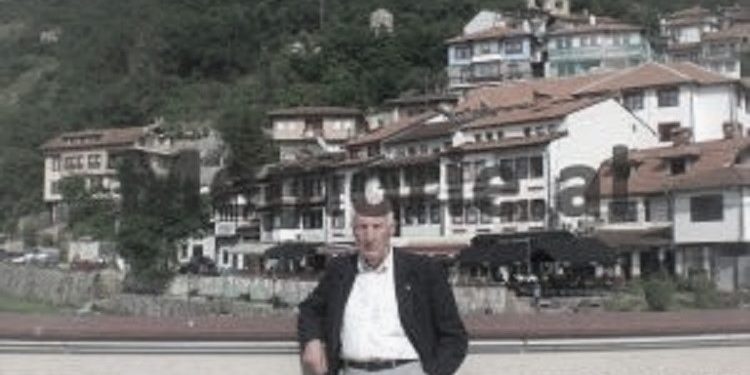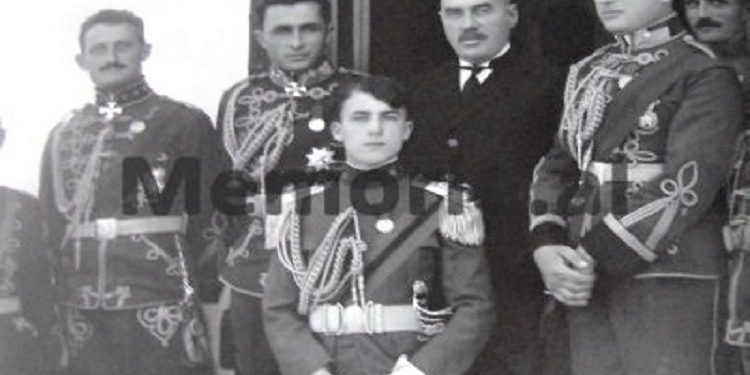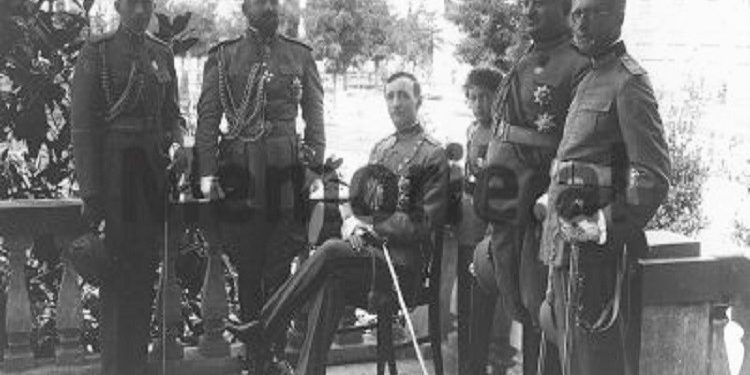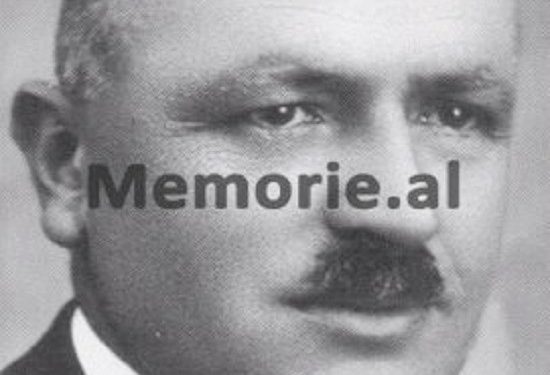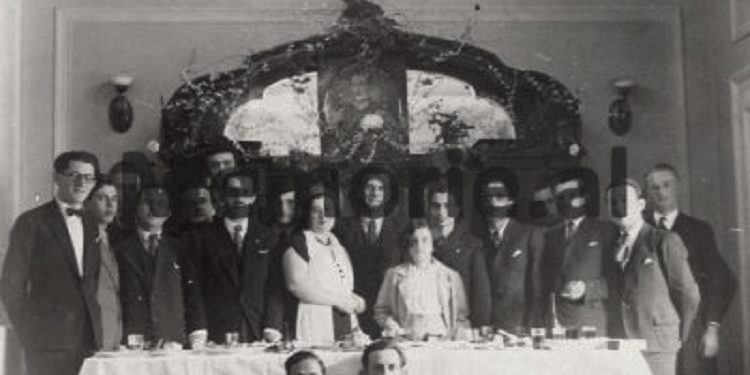Dashnor Kaloçi
Memorie.al publishes the unknown story of Kristo Luarasi, the famous patriot from Cologne, who after receiving his first lessons from Petro Nini, served as an Albanian language teacher in the villages of his province and later emigrated to Bucharest and Sofia, Bulgaria., where together with some other patriots, he opened the first Albanian printing house, publishing books, newspapers and magazines in his mother tongue. All his career and that of his son, Thoma Luarasi, the career diplomat in the period of the Zog Monarchy who represented Albania in the League of Nations, as well as in the diplomatic headquarters abroad for 20 years in a row, in the testimonies of ing. Genc Luarasi, son of Thomas.
One of those prominent patriots of the period of the National Renaissance and the one after the declaration of Independence, who put their whole life in the service of the national cause, sparing nothing for the good of Albania, is undoubtedly Kristo Stefan Luarasi, who after serving for some time as an Albanian language teacher in the villages of his province, emigrated to Bucharest and then to Sofia, Bulgaria. There he opened the first printing house to print books, newspapers and magazines in the Albanian language, which were then distributed free of charge wherever there were Albanians. Regarding his life, work and all his patriotic activity, as well as his son, Thoma Luarasi, the career diplomat, who for years represented Albania in the League of Nations, we know the testimonies of ing. Genc Luarasi, son of Thomas and nephew of Christ.
Kristo Luarasi and his family
According to the testimonies of Ing., Genc Luarasi, his grandfather, Kristo Stefan Luarasi, was born in 1875 in the village of Luaras in the district of Kolonjë, where the early origin of the family of his father, Stefn Kic, is from which is still located today in the village of Zvininë in Korça. Immediately after finishing school, when he was not more than 18 years old, with the direct interest of his teacher, Petro Nini Luarasi, Kristua was one of those Colonial boys who were selected and appointed as Albanian language teachers in the sub-prefecture of Kolonja, serving in Vodica and Luaras. Likewise, Christos’s wife, Poliksen, who was one of the only girls to graduate from the boys’ school in Korça, served as a teacher at the ‘School for Girls’ in the city of Korça. Kristo Luarasi did not serve long as a teacher in the villages of Kolonja, as Albanian schools were closed by the High Gate of Istanbul and he was forced to emigrate outside Albania. He first settled in Bucharest, Romania, and then moved to Sofia, Bulgaria, where the Albanians had established their colony. After several years of working as a typographer in a Bulgarian printing house, with the money saved, Kristo bought a printing house himself, which he named “Mbrothësia” and turned it entirely into a service for printing books in the Albanian language.
Kristo, print the “National Calendar” in Sofia
After the establishment of his printing house in 1897, Kristo started publishing the ‘National Calendar’, which he published for 17 years. For the publication of that calendar which was distributed wherever there were Albanians, Kristo collaborated closely with some of the most famous Albanian patriots of the National Renaissance of that period, publishing and printing the Albanian newspapers: “Drita” and “Liria e Shqipërisë”, as well as about 150 titles of books by well-known Albanian authors such as: Naim, Sami and Mit’had Frashëri, Faik Konica, Sotir Qirjazi, Spiro Dine, etc. In the years 1896-1920, in addition to the Albanian periodical press, in that printing house were printed many textbooks in the Albanian language, most of which were then distributed free of charge in all Albanian areas, including Kosovo. During the years that Kristo Luarasi owned that printing house, he carried a great load, working as a typographer, publisher, newspaper director, etc., without ever detaching himself from journalism, being one of the ardent defenders of the Albanian issue. In 1809, after the proclamation of the Entry, Kristo left Sofia and settled in Thessaloniki, Greece, thinking that it would be closer to Albania and would help spread Albanian books more. In the city of Thessaloniki, he greatly increased his patriotic activity and in his printing house, he managed to publish up to 60 titles of books, newspapers and magazines in the Albanian language, including that of Mihal Grameno. But, after some time, in 1911, he returned again to Sofia, as in the city of Thessaloniki, the political circumstances that were created, not only did not favor his patriotic activity, but significantly hindered it. A year later, in November 1912, he welcomed the proclamation of the Independence of Albania, to which he had devoted all his energy since his youth. In 1915, Kristo resumed the publication of the newspaper “Liri e Shqipërisë”, which he kept until 1920, when after the Congress of Lushnja, he decided and finally returned to Albania.
Christ’s return to Albania in 1920
After returning to Albania, Kristo Luarasi moved with his family to Tirana, initially sheltering in a house of the well-known Tirana family, Stërmasi. There he lived until 1923, and at that time he bought a house on Kavaja Street. After he settled in his apartment, somewhere near the sled he set up the printing house (“Mbrothësia”) that he had in Sofia, which from that time onwards, began to be known as: “Luarasi” printing house. As in Bulgaria, from 1923 to 1947, that printing house printed dozens of titles of books and textbooks in the Albanian language, as well as many of the publications of the state entities of the governments of those years. Besides them, during that period of time and especially after 1934 when that printing house was named “Luarasi Publishing House”, there were printed and published a series of art books, newspapers and magazines, such as: “Teacher”, “Flag”, Education ”(1922),“ Free Albanian ”(1923),“ Where do we go ”(1924),“ Albania ”(1926),“ Teacher ”(1927),“ Union of the Nation ”(1942), etc. In the Printing House “Luarasi” were published a series of books by well-known Albanian and foreign authors, such as: De Rada, Sterjo Spasse, Mit’hat Frashëri, Haki Stërmilli, Nexhat Hakiu, Thoma Floqi, Xhevat Belegu, Milto Sotir Gurra , Victor Hygo, Honore de Balzak, Alexander Dyma, De Foe, Alfons Dode, Leon Tolstoy, etc. Kristo Luarasi passed away in 1934 and since then, the printing house and publishing house he owned have been run by his family and relatives. The life and work of the colonial patriot Kristo Luarasi, was not only appreciated during the years of the Zog Monarchy, but his patriotic activity in the service of the Albanian cause, was recognized and appreciated by the communist regime of Enver Hoxha, who in 1962, decorated him with the Order of the Second-Class Flag, for “Patriotic Activity.” Likewise, even after the 1990s, on the occasion of the 80th anniversary of the Declaration of Independence, he was honored with the “Torch of Democracy” medal. The life and patriotic activity of Kristo Luarasi has been widely written in many books, newspapers, national and foreign magazines, as well as in the publications of the Academy of Sciences of Albania and the history texts of Albania. In fact, Fan Noli, in his speech held on the anniversary of the Declaration of Independence in the USA, considered Kristo Stefan Luarasi as: ‘one of the 28 pioneers of the creation of the Albanian state’.
Christ’s nephew, Lluka Luarasi, “Martyr of the Fatherland”
Kristo had another brother, Lluka, and four sisters, who together with Lluka, emigrated to the USA, where they started their own families by marrying Albanians. While the four Luarasi sisters stayed permanently in the USA, Lluka, who worked for some time in road construction companies, returned to Albania where he married a girl from the city of Korça. From that marriage they had a son (named after his grandfather, Stefan Luarasi), who after graduating from the French Lyceum of Korça, with the intervention of his cousin, Thoma Kristo Luarasi, won a state scholarship from the government of Zog and in 1935, graduated from one of the universities of Turin, Italy. During his studies in Italy, Stefani came in contact with some friends who had communist ideas, which caused him to return to Tirana, to participate in the Anti-Fascist Movement and to be interned by the Italians in Saranda. After his release from prison, he became a partisan and was appointed deputy commissioner of the Slovo gang in the Peshkopi area, where he was killed in an attempt by Halil Alia’s nationalist forces in Fushë-Aliaj. After the end of the War, he was proclaimed ‘Martyr of the Fatherland’, while his father, Lluka, left without children, expressed the desire and adopted his cousin, Thomain, the son of Kristo Luarasi. Christ’s son, after being laureate in Sofia, served as Zog’s diplomat
Thoma Luarasi, the representative of Albania in the League of Nations
Christos’s son, Thoma Luarasi was born in Sofia, Bulgaria in 1910, where his father, the famous patriot Kristo Luarasi, had emigrated since 1896, after leaving Romania. In the city of Sofia, Thomai completed his high school education and in the years 1927-1930, he graduated from the Faculty of Law with a degree in Law and Economics. While studying in Bulgaria, his family had returned to Albania since 1920. In 1924, by ministerial decree of the government of Prime Minister Sulejman Delvina, he was appointed to the Ministry of Foreign Affairs, with the post of attaché-typist., at the Albanian Consulate General in Sofia, Bulgaria. After graduating from the Faculty of Economics in Sofia, Thomai continued his diplomatic career at the Ministry of Foreign Affairs of the Albanian state abroad, serving in a number of positions. Initially, in the years 1930-1932, he was appointed to the post of Third Secretary at the Political Directorate in the Ministry of Foreign Affairs in Tirana, when Rauf Fico was Minister. In the years 1932-1933, he served as the Third Secretary in the Albanian Legation in Belgrade, in the years 1933-1935, he returned and worked as the Third Secretary in the ministry in Tirana, while in 1935, he was appointed with royal decree, in the function of the second secretary at the Albanian consulate-general in Alexandria, Egypt, but he could not exercise that task, as that consulate-general was not opened due to lack of funds. Based on this fact, Thoma Luarasi continued his work at the Ministry of Foreign Affairs in Tirana and in 1936, he was appointed as the Secretary of the Royal Consulate of Albania, II Secretary, as well as Secretary of the Albanian Representation at the League of Nations in Geneva, duties which he held regularly until 1939. In the same year, he was appointed Secretary (Chargé d’Affaires) of the Provisional Mission of the Kingdom of Albania to the League of Nations in Geneva, covering mainly legal and economic-social affairs. During that time, he was working in Geneva, he met and married a Polish girl named Janina Kackovska, whom he brought to Albania and spent all his life together. In the period 1938-1939, Thomai was appointed as the Second Secretary of the Albanian Legation in Berlin, a position which he continued until April 1939, when Albania was invaded by the fascist Italy of Benito Mussolini. After that, Thoma Luarasi returned to Albania, and in the years 1939-1942, he continued to work as a functionary at the Prime Ministry in Tirana. While in the years 1942-1943, he served at the Ministry of Freed Lands, with the position of Director of General Affairs Studies. A year later, he returned to the Ministry of Foreign Affairs in Tirana, serving as the First Legate Secretary in the Political Directorate in the section of Treaties and Economic-Financial Affairs, with which he closed his career. in diplomacy. During those years that Thomai served as a career diplomat, thanks to his education in Bulgaria, Austria and Switzerland, he worked with great dedication, being rewarded with a series of medals and decorations by King Zog and the regency of that time.
The newspaper “Java” of July 11, 1937, an article about Kristo Luarasi
The name, life and work of the famous colonial patriot, Kristo Stefan Luarasi, was highly valued even during the period of the Bird Monarchy. Thus, in an article published in the newspaper “Java” of July 11, 1937, the publicist Alo Dhusha, among other things, wrote: “True patriots are not those who, in normal times, express a love for the homeland, but true patriots are they who, in abnormal times, in times of slavery, when they are being persecuted by the invaders just because they love their Nation and Homeland, work for this ideal without being repulsed by the fear of the power of the invader. “Gold” is tested in the fire. The true patriot in war in effort, in danger. Such patriots should be mentioned, not forgotten. The example of these should be an inexhaustible source in … “. With these words almost, His Grace, Monsignor Christopher, Archbishop of all Albania, opened his discourse on the occasion of the whisper that took place in the Orthodox Church in Tirana last Wednesday, for the repose of the soul of the late Christo Luarasi. Indeed Kristo P. Luarasi, was not only an Albanian who felt a love and compassion for his nation and Homeland, he was a patriot who did not count any sacrifices, when it came to working for his ideal, for an Albania is free and you do not back down in the face of any danger. When he was young, 18 years old, in 1892, Kristo Luarasi, regardless of the risks, became a learner of sweet Albanian, in his native country and then in Athens and then in Romania, and wherever you are you do not try, but to transmit to the Albanian people the flame of patriotism that burned in his heart. Very soon, in 1896, a 21-year-old boy established the first Albanian printing house in Romania and began publishing in his mother tongue, launching the first national calendar. This is followed by other publications, which circulate from hand to hand among the enslaved Albanians. Then we see him in Bulgaria. He organized the notebook “Drita”, which he publishes regularly with Shahin Kolonja as its director. “Drita” was distributed and circulated everywhere where Albanian was spoken. He awoke the sleeping and electrified the awake. Uncalculated material sacrifices and personal hardships. But the pleasure he felt when he saw that he and his friends were leaving, you were on fire coming out of nowhere, did not leave him time to think about hardship and sacrifice. In Istanbul, Naimi had formed the first Albanian cell and every Friday he gathered the Albanians and opened the doors of the Albanian truth. With his poems, he created fanatical Albanian soldiers. Kristo Luarasi goes to Istanbul, matures (meets) with these valuable patriots, encourages him and pushes him to publish his poems. Thrown in Thessaloniki. There, a group of patriots worked for Albanianism. Kristo Luarasi, finds in those patriots’ values; joins and publishes together with Mr. Lumo Skëndon, the newspaper “Lirija”, and the magazine “Dituria”. At the same time, he publishes a book “Albania, what it was, what it is and whatever it is”. At this time, the national effort has taken on great proportions. But even the reaction has been strong. Sadly, the clashes between the Albanians endangered the interests of the Nation. Kristo Luarasi, this character so strong and that face so gentle, and sweet, intervenes and unites. The Turkish authorities, and those who had every interest in the Albanians being divided and eating each other, find the most dangerous man in the person of Kristo Luarasi and decide to exterminate him. It was family then Christ. What does that mean? Mrs. Luarasi, a friend of life, of effort and of dangers, gathers her children and at night leaves Thessaloniki. Among the dangers he arrives in Sofia. Are you tired of Christ? Jo! Ay who works for his Nation and Homeland, does not get tired. No time should be wasted. Kristo Luarasi creates the notebook “Freedom of Albania” under his personal direction. And it says in its first issue on March 10, 1911: “With the will of you and many patriots, we started printing the sheet” Freedom of Albania “here in Sofia. Your program will be filled with our own. We will act with flesh and soul, spreading knowledge and national feelings to my beloved nation to escape from ignorance and darkness … “. And in the following issues, with his fiery feather, he denounced the injustices done to our nation and trumpeted to the whole world that the Albanian Nation has the right to live in this world and to continue its millennial and glorious history. All of Christom Luaras’s articles stand out for their boldness. The truth must be told, regardless of whether the powerful of the day are spoiled. And Christ said it, so naked as to be told the truth. Kristo Luarasi had dedicated his life to the national cause and believed that only through knowledge could the nation wake up and gain its freedom. And throughout his life, for 40 or so years in a row, he did not try, except to spread knowledge. In addition to newspapers and magazines, he published a large number of books and brochures, in addition to primers and school chants. Among these stand out: “Sea Waves”, “Erveheja”, “The Great Ali” etc. After gaining self-government, Kristua did not quit, but continued to work nationally. This was Kristo Luarasi. We do not believe that the state should not honor the memory of this valuable patriot and we take the courage to propose that the Municipality of the Capital baptize one of its streets with the name “Kristo P. Luarasi”. Memorie.al




